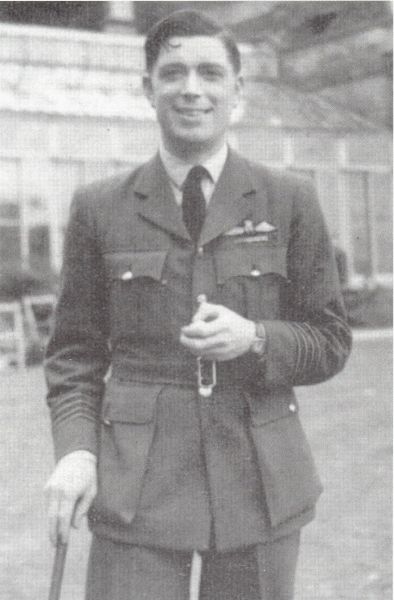Rosier, Frederick Ernest
- Date of birth:
- October 13th, 1915 (Wrexham/Wales, Great Britain)
- Date of death:
- September 10th, 1998 (Llangollen/Wales, Great Britain)
- Nationality:
- British
Biography
Service number 37425.
The son of an engineer with the old Great Western Railway, he was born in Wrexham and spent part of his childhood in nearby Corwen. He went to Grove Park School, Wrexham, where he distinguished himself by playing rugby for North Wales Schoolboys and performing as a talented violinist in a local youth orchestra.
He seriously considered a career in the police, before opting instead for the RAF and a short service commission. After training as a fighter pilot he applied for a permanent commission, only to be told that he would have to retrain as an engineer. Reluctantly, he moved to the RAF School of Aeronautical Engineering at Henlow. He was saved, however, a few weeks later by the outbreak of the war, which immediately posed a need for trained pilots.
During operations over the Dunkirk beach-head, he was shot down and badly burned whilst attempting to bale out of his doomed Hurricane. He was shot down once again in 1941, this time whilst on an operation to Tobruk. However, he escaped from his aircraft and was able to make a three day march through enemy lines back to the British side.
After France and the desert, Rosier returned to this country in 1943 and took command of a succession of bases, including the fighter station at Northolt, where he formed a great admiration for his Polish aircrews. He ended the war back on the Continent as Group Captain (Operations) of 84 Fighter Group.
He went to the United States on an exchange in the late 1940's and on his return began a steady ascent through the ranks. He chaired the Joint Planning Staff at the Ministry of Defense under Lord Mountbatten (then Chief of the Defense Staff) and went to Aden in the early 1960s as Air Officer Commanding the Middle East Air Forces.
More postingsfollowed. He then moved to his final post as NATO's deputy Commander-in-Chief of Allied Forces Central Europe, based in The Netherlands, in 1970 and retired three years later.
He then joined the British Aircraft Corporation (BAC) as a director and military adviser and in 1977 left for Saudi Arabia to take charge of the multi-million pound contract under which BAC supplied Lightning Fighters and also ran much of the infrastructure of the Saudi Air Force. For Rosier, who had grown to love the desert, it was an ideal job.
He retired for the second time in 1980, returning to live in the Welsh hills outside Llangollen. A skilled carpenter, a gift he had inherited from his father, he spent much of his spare time in his workshop.
But Fred Rosier was still better known for his violin. He carried it with him wherever he went and played it as often as he could.
He also worked in retirement for the Polish Airmen's Benevolent Fund and led the appeal to build a new Polish war memorial at RAF Northolt. Decorated by the Dutch and the Poles after the war, he also was admitted to the Polish Order of Merit.
A service of thanksgiving for him was held 14 December 1998 at St. Clement Danes. After the service there was a fly-over of four Tornadoes from 43 (F) Squadron, RAF Leuchars.
His uniform and medals have been donated to a new museum set up at RAF Leuchars in mid 2008.
Promotions:
21st October, 1935: Acting Pilot Officer (P)
26th August, 1936: Pilot Officer
26th April, 1938: Flying Officer
26th April, 1940: Flight Lieutenant
1st June, 1941: (T) Squadron Leader
1st June, 1942: (T) Wing Commander
20th November, 1942: [1 Jun 1941]: Squadron Leader
20th March, 1943: Acting Group Captain
20th September, 1943: Wing Commander (WS):
1st July, 1947: Wing Commander
1st January, 1953: Group Captain
1st April, 1958: Acting Air Commodore
1st January, 1959: Air Commodore
1 July, 1961: Air Vice-Marshall
3th March, 1966: Acting Air Marshall
1st July, 1966: Air Marshall
1st March, 1970: Air Chief-Marshall
Do you have more information about this person? Inform us!
- Period:
- Second World War (1939-1945)
- Rank:
- Acting Wing Commander
- Awarded on:
- February 13th, 1942
"This officer has commanded a fighter wing since the commencement of the operations in Libya. Both in the air and on the ground, his courage and efficiency have been inspiring throughout. On one occasion, when one of our fighter wings was being attacked by a large number of enemy aircraft, Wing Commander Rosier joined in the engagement. When breaking clear he observed one of our pilots who had been forced to land in enemy territory and, in an attempt to rescue him, Wing Commander Rosier landed his aircraft. He was unable to take off again owing to the close proximity of enemy forces. Nevertheless, both pilots eventually got away and, after many narrow escapes, succeeded in regaining base after a period of 3 days. Wing Commander Rosier is an outstanding fighter pilot and leader."
- Period:
- Second World War (1939-1945)
- Rank:
- Wing Commander
- Awarded on:
- June 2nd, 1943
- Period:
- Second World War (1939-1945)
- Rank:
- Group Captain
- Awarded on:
- January 1st, 1946
- Period:
- Second World War (1939-1945)
- Rank:
- Wing Commander
- Awarded on:
- October 31st, 1947
Sources
- Photo 1: The Battle of Britain London Monument
- Photo: The Battle of Briatin London Monument
- - Third Supplement to The London Gazette Issue 35454 published on the 10 February 1942
- Supplement to The London Gazette Issue 36033 published on the 28 May 1943
- Supplement to The London Gazette Issue 37407 published on the 28 December 1945
-The London Gazette Issue 38113 published on the 31 October 1947
- Air of Authority - A History of RAF Organisation
- Georgia Southern University
- The Independent






